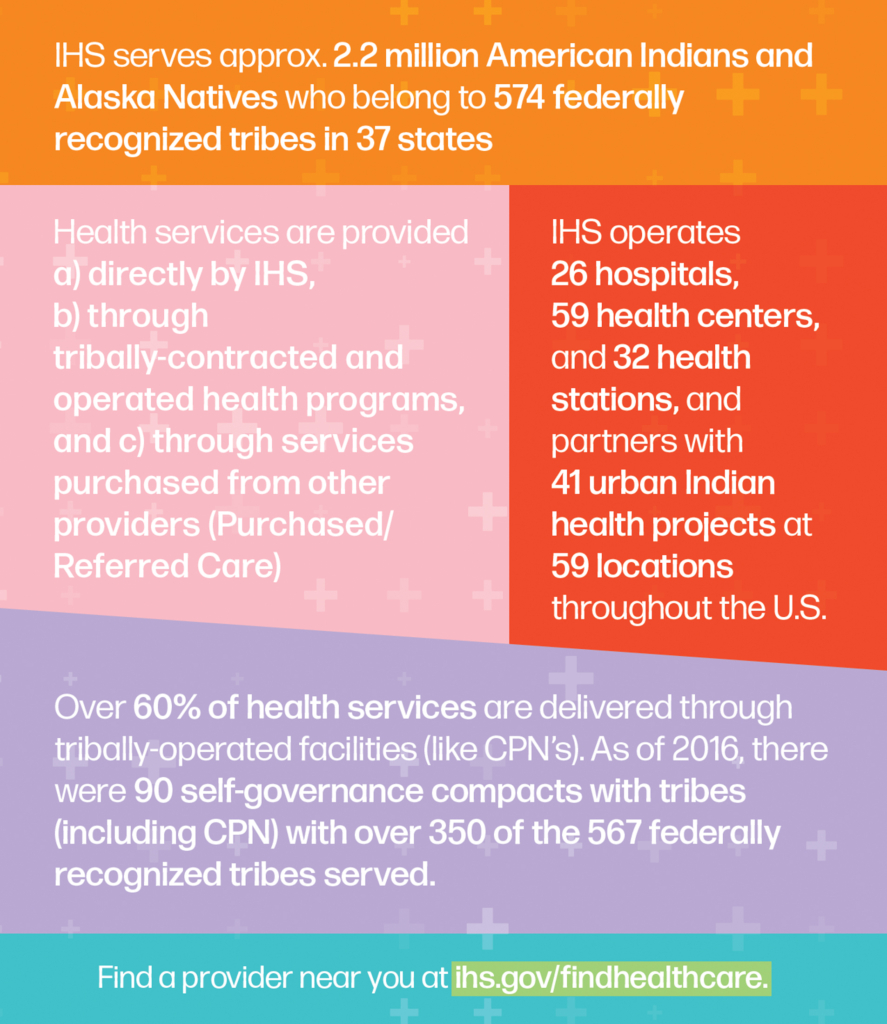Citizen Potawatomi Nation Health Services staff are always happy to see Tribal members at the Nation’s East or West Clinic, and any Tribal member is eligible to receive care at CPN facilities. However, CPNHS recognizes that time and distance can be a challenge for Tribal members living outside of Oklahoma.
Clinical Operations Director Lauren Bristow spoke with the Hownikan about ways that Tribal members across the country can access health care through CPN and the Indian Health Service.
CPNHS
CPNHS offers primary medical care, prenatal care, dentistry, optometry, public health services, laboratory services, pharmacy, X-ray, ultrasound, mammography, behavioral health services, chiropractic care, physical therapy, cardiology services, focused diabetes care and more.
All CPN tribal members are eligible for care at CPNHS clinics.
“Unfortunately, we are a bit limited within CPNHS on what we can offer out of state Tribal members due to various legal and licensing issues across states,” Bristow said.
Nevertheless, there are a few ways that CPNHS can help, she said.
CPNHS has a mail order pharmacy program, which is structured to support the prescription needs of out-of-state elders and Tribal members on SSI (Supplemental Security Income).
To qualify for the mail order pharmacy, the Tribal member must live outside of Pottawatomie County and must either be 63 years of age or older or receive SSI benefits.
Call the East Clinic at 405-273-5236 and ask to speak to the pharmacy for more information. Find the mail order pharmacy information packet at cpn.news/mailorder.
Additionally, CPNHS blocks off time during the Nation’s annual Family Reunion Festival to see Tribal members travelling from out of state.
“It’s a great time to get that annual wellness exam and annual eye exam, among numerous other services,” Bristow said.

IHS
For health care closer to home, the Indian Health Service is a great resource.
IHS is an agency within the U.S. Department of Health and Human Services responsible for providing federal health services to American Indians and Alaska Natives, according to its website. This service is in fulfillment of trust agreements made with Native nations, which stipulated that the federal government would provide certain services to those nations, including health care services. Currently, the IHS operates in 37 states and provides services to over 2 million American Indian and Alaska Natives who belong to 574 federally recognized tribes.
CPN tribal members are eligible for care at all facilities directly operated by IHS.
Tribal members can find an IHS facility close to them by using the “Find Health Care” map at ihs.gov/findhealthcare.
Additionally, Tribal members are likely eligible to receive care at tribally-operated facilities.
Through the Indian Self-Determination and Education Assistance Act of 1975, and a later amendment to this act in 1994, Native nations can assume the administration of some federal services, such as health services. CPNHS was established by such a compact in 1997, and today, over 60 percent of the IHS appropriation is administered by tribes, according to the IHS.
Bristow noted that it is best to contact the individual clinic to verify eligibility when seeking care at tribally operated facilities, as qualifications and services may differ.
Telehealth
Tribal members are also eligible for telehealth benefits in any state through CPN Care. Registered patients receive 24/7 access to doctors, counselors, pharmacy discounts and more via phone, video or mobile app. This benefit is available at no cost to Tribal members and their dependents.
Find CPNHS online at cpn.news/health or call 405-878-4693. Learn more about the IHS at ihs.gov. Register for CPN Care at cpn.news/CPNCare.
